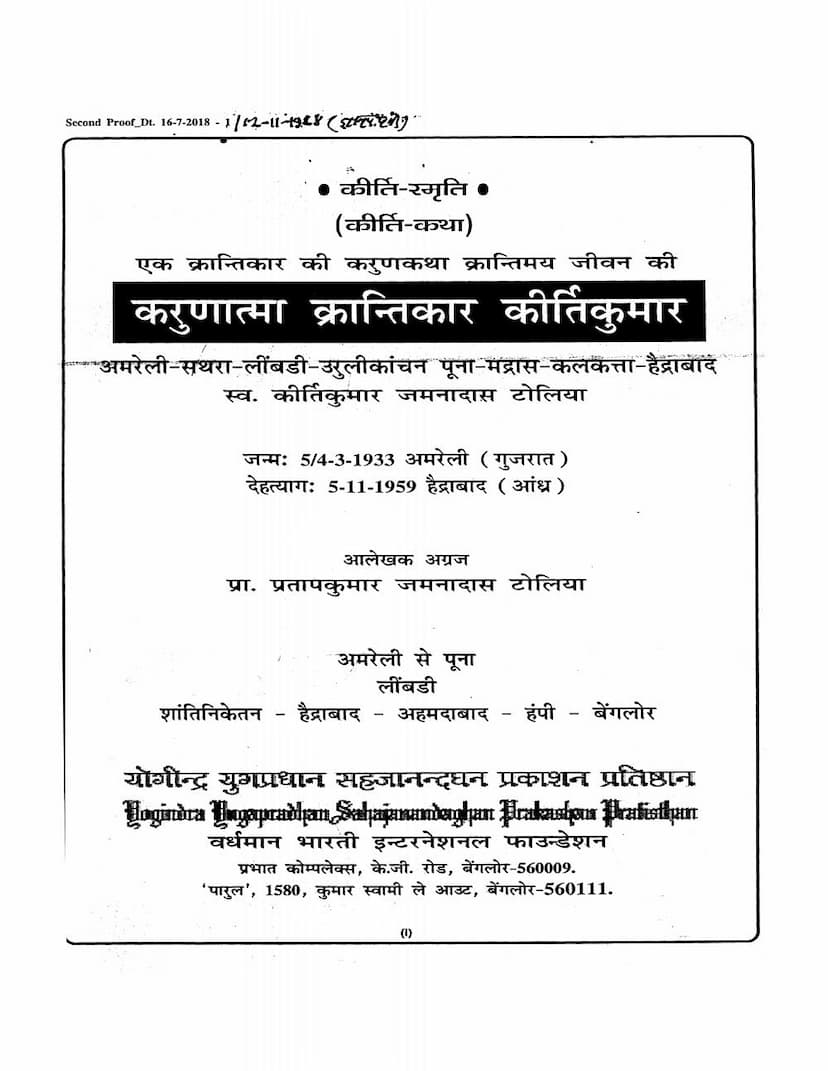Karunatma Krantikar Kirti Kumar
Added to library: September 2, 2025
Loading image...

Summary
This book, "Karunatma Krantikar Kirti Kumar" by Pratap J Tolia, published by Vardhaman Bharati International Foundation, is a biographical account of Kirtikumar Jamnadas Tolia, who passed away at the young age of 26. The book details his life, his revolutionary ideals, and his compassionate nature, even amidst his struggles and untimely death.
Key aspects of Kirtikumar's life as depicted in the book:
- Early Life and Ideals: Born in 1933 in Amreli, Gujarat, Kirtikumar was raised in a family that valued nationalistic sentiment, the principles of Jainism (especially non-violence and compassion), music, and literature. His parents instilled in him a strong sense of service, duty, and empathy.
- Revolutionary Spirit: Kirtikumar was deeply inspired by Indian freedom fighters like Bhagat Singh, Subhash Chandra Bose, and others. He aspired to create a corruption-free India and was drawn to the revolutionary paths of figures like Jayaprakash Narayan and Vinoba Bhave, eventually aligning with the non-violent revolutionary path.
- "Richism" (Sampannatavad): Kirtikumar developed a unique ideology he called "Richism," which aimed at making everyone prosperous, not just the wealthy. He believed poverty was the root of many evils and sought to uplift the poor and downtrodden through ethical means and hard work. He even started a small factory with worker-partners, embodying a form of cooperative ownership.
- Compassion and Sacrifice: Kirtikumar was a profoundly compassionate soul. He chose a difficult and risky path, dedicating his life to social reform and helping those in need, even risking his own safety. He was known for his integrity and his refusal to compromise his principles, even when faced with corruption or personal hardship.
- Ahimsa (Non-violence) and Jain Principles: Despite facing violent situations and being tempted to resort to violence, Kirtikumar remained committed to the principles of Ahimsa, deeply influenced by his Jain upbringing and his study of Jain scriptures. His final moments were filled with the chanting of the Navkar Mahamantra, and he extracted a promise from his brother not to administer any violent medicine to his body.
- Mysterious Help and Divine Intervention: The book describes instances of seemingly miraculous help Kirtikumar received during his illness, particularly from a mystic named Gurdial Mallikji. There is also an account of a divine manifestation, where Kirtikumar reportedly communicated with Jain deities, receiving guidance and revelations about his own life, family, and future.
- Challenges and Hardships: Kirtikumar faced numerous challenges, including financial difficulties, betrayal by relatives, and ill health. His family, particularly his elder brother, often found themselves trying to support and protect him from exploitation.
- Brother's Perspective: The book is written from the perspective of his elder brother, Pratapkumar Tolia, who shares his deep love, admiration, and also his own struggles in understanding and supporting Kirtikumar's unconventional and often difficult path. He recounts Kirtikumar's experiences, his letters, and the tragic circumstances of his early death.
- Legacy: The book highlights Kirtikumar's dream of a just and compassionate India, and the author expresses hope that Kirtikumar's story and ideals will inspire future generations to work towards such a vision. His life, though short, was dedicated to a noble cause, leaving behind a message of selfless service and revolutionary change through compassion and ethical living.
In essence, "Karunatma Krantikar Kirti Kumar" is a moving tribute to a young revolutionary whose life was a testament to compassion, sacrifice, and a deep commitment to social justice, even in the face of immense personal adversity.